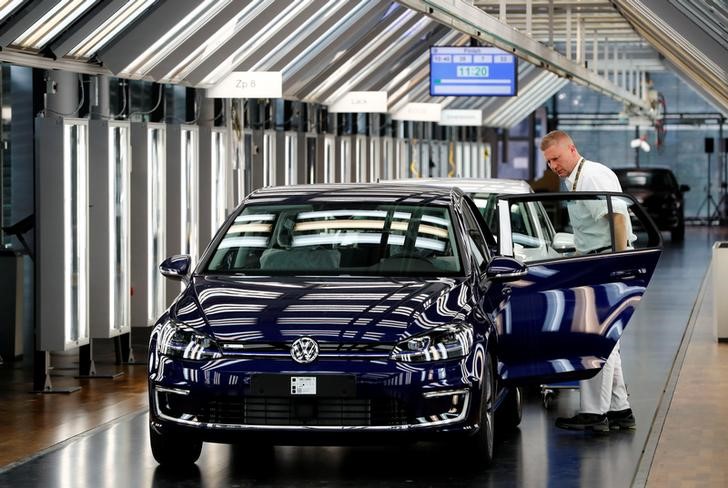Gold prices slip after rallying on Powell rate cut talk
Investing.com -- Volkswagen AG (ETR:VOWG) is planning to incorporate new import fees into the prices of its vehicles entering the U.S., signaling the immediate impact of President Donald Trump’s 25% auto tariffs on Europe’s largest automaker.
As reported by Automotive News, Volkswagen issued a memo to U.S. dealers outlining the additional costs and temporary measures to suspend rail transport of vehicles from Mexico, as well as hold cars arriving from Europe at ports.
At 06:47 ET (10:47 GMT) after the tariffs were introduced, Volkswagen, Mercedes, and BMW (ETR:BMWG) stocks in Germany had fallen by 1.4%, 2.2%, and 2.1% respectively.
A company spokesperson confirmed the memo’s existence but declined to provide details, the report said.
German automakers, including Volkswagen, Mercedes-Benz (OTC:MBGAF) Group AG, and Porsche AG, are among those most affected by the newly imposed tariffs.
With strong demand for high-margin SUVs and a slower transition to electric vehicles among U.S. consumers, the American market remains a crucial revenue source for these manufacturers.
Hildegard Müller, head of Germany’s automotive industry association VDA, described the tariffs as a "fundamental turning point in trade policy," cautioning that the move would have widespread negative consequences.
She warned that American consumers could face increased inflation and fewer vehicle options.
Since taking effect on Thursday, the 25% tariff has already disrupted the automotive sector, prompting a surge in purchases ahead of price hikes and sparking concerns over rising costs.
Mercedes-Benz is reportedly considering discontinuing certain lower-margin imported models, such as the GLA compact SUV, from the U.S. market, according to Bloomberg News.
Financial markets reacted to the tariff introduction, with German automotive stocks declining.
Germany’s outgoing economy minister, Robert Habeck, welcomed the European Commission’s initiative to engage in trade discussions with the Trump administration.
However, he warned that a firm response would be necessary if a compromise was not reached, cautioning that escalating trade conflicts could lead to economic downturns and global repercussions.
Volkswagen has a manufacturing facility in Tennessee that produces the ID.4 electric SUV and the larger Atlas (NYSE:ATCO) SUV. Meanwhile, models such as the ID.
Buzz van and Golf hatchback are imported from Europe, while the Tiguan, Taos, and Jetta, among others, come from Mexico.
The German automaker has been actively expanding its presence in North America, which accounted for nearly 20% of its revenue last year.
In 2024, Volkswagen saw a 7% increase in regional deliveries, helping offset declining sales in China.
The impact of the tariffs extends beyond German manufacturers. Last week, Italy’s Ferrari NV (NYSE:RACE) announced plans to increase the prices of some models in the U.S. by up to 10%, potentially adding tens of thousands of dollars to sticker prices.
British car manufacturers are also feeling the pressure. With nearly 80% of UK-produced vehicles exported last year, American consumers could see higher prices for brands like Range Rover, Mini, Bentley, and Aston Martin (LON:AML).
Mike Hawes, chief executive of the Society of Motor Manufacturers and Traders, noted that automakers cannot absorb the increased costs, ultimately leading to higher prices and fewer choices for U.S. buyers.
He added that UK-based producers might need to reassess production levels due to weakened demand.
